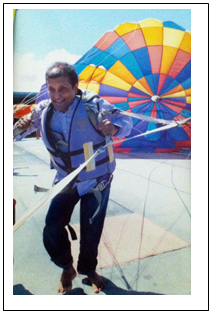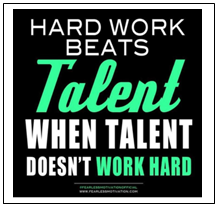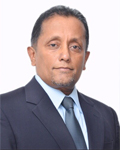ATTITUDE - Lessons from Super Champions
By : Eng.Arjuna ManamperiThe very best in all fields of work; hold themselves to high standards and self evaluate against such standards and not against others. They are blessed with great mentors who nurture them from early years of their lives. They are the Super Champions who relentlessly nurture their talents to turn them to super skills to achieve the impossible!
Visualize Usain St Leo Bolt beating a group of Olympic runners to the finish line or, Kumar Sangakkara scoring another century beating all odds on a bowlers wicket or, think of the journey of a Nobel Prize winning scientist who is one of a kind among many such brilliant minds, and the list could go on. One thing is clear, they are the Super Champions in their chosen fields of work.
 The Almost Greats, who are by no means average people, end up in different leagues and sometimes fade away irrespective of their immense talent to reach such dizzying heights. This is similar to some of us reaching university level education when thousands in our classes don’t make the needed z-score at the A/L exam. Yet, in the next race of “career growth”, once again, a few emerge as Super Champions while thousands of well educated, experienced professionals (almost greats) end up with relatively average careers.
The Almost Greats, who are by no means average people, end up in different leagues and sometimes fade away irrespective of their immense talent to reach such dizzying heights. This is similar to some of us reaching university level education when thousands in our classes don’t make the needed z-score at the A/L exam. Yet, in the next race of “career growth”, once again, a few emerge as Super Champions while thousands of well educated, experienced professionals (almost greats) end up with relatively average careers.
At the highest level, what differentiates a Super Champion from almost greats? An attitude of “never satisfied” that pushes them to take on all types of adversities at the highest level is the secret of Super Championns. What factors influence a “never satisfied attitude” that gives extra strength to overcome challenges / failures?
Love what they do. Champions have dabbled in many sports they “love” in their formative years. For example, our own champion batsman, Kumar Sangakkara (https://en.wikipedia.org/wiki/Kumar_Sangakkara ) was a national level Tennis player (among other sports he did as a Trinitian) before he dedicated his sports career to Cricket. Even at it, he kept wickets and became a great Wicket Keeper, too. Super Champions don’t specialize in early careers, instead they try a few things they love and dive into them with high enthusiasm. My father who is 93 years - an Irrigation Engineer - was a national level Cricket allrounder who played many sports as a Trinitian and a Rajan. To date, his passion is sports. My brother who was a gifted opening batsman at a very early age and even entered Royal College A/L thanks to his classical batting skills. Yet, he didn’t become the national champion he could have, because he never showed that “maniacal enthusiasm” to bat and practice. He became an also ran, although he was gifted. Isn’t it interesting that the IESL Charter process encourages overall exposure in early years of work? In how many different industry sectors have you practiced? Within the organization you work, have you had challenges of working in different functional areas? If you are Super Champion material, you would jump at such career changes as opportunities to grow and thrive in the process.
Goal is self-improvement. Champions compete with themselves and always try to up their game. They don’t compare themselves with others in their league. Where as, almost greats would compare their performances with various external benchmarks, that would distract their focus from self improvement and making excellence a habit.
 Parents were mentors. It is not a cultural or a regional thing to hear many Super Champions praising their parents as great mentors or recognizing their coaches as second parents! The influence of parents who give freedom to children to find out their true calling, is a gift of a lifetime for any future super champion. Not many parents do that. What’s common is parents driving children to achieve goals set by them. Instead, what’s important is the encouragement that comes after early failures and the assurance of parents when children try what the latter might consider risky.
Parents were mentors. It is not a cultural or a regional thing to hear many Super Champions praising their parents as great mentors or recognizing their coaches as second parents! The influence of parents who give freedom to children to find out their true calling, is a gift of a lifetime for any future super champion. Not many parents do that. What’s common is parents driving children to achieve goals set by them. Instead, what’s important is the encouragement that comes after early failures and the assurance of parents when children try what the latter might consider risky.
Once my father said “failures were the pillars of success.” My parents never made a fuss about my polio affected left leg that prevented me from participating in any official sports teams at school. I have no doubt, it was such upbringing that made me to perform to win university (Peradeniya) sports colors in wrestling and badminton. As with all of us, I have had failures and successes throughout my life, but, thanks to the spirit of adventure inculcated by my parents that defy the fear of failure, I always surge ahead. Perhaps, this is why I was never afraid to take up career challenges or even change jobs for the excitement of learning something new at a lower pay, knowing I would achieve greater heights.
 Nurture the nature. All super achievers are talented (nature) in some way(s). Unlike the average folks, they nurture their natural talents through relentless practice to turn them to super skills. Former US President, Barack Obama is well known for his highly captivating oratory skills, always write his speeches and practices many times before a delivery . Super Champions don’t stop at that, they apply those super skills persistently until they achieve their goals. Think Elon Musk of Tesla or Publis Silva of Hotel Mount Lavinia (https://www.pressreader.com/sri-lanka/daily-mirror-sri-lanka/20120530/282780648557331).
Nurture the nature. All super achievers are talented (nature) in some way(s). Unlike the average folks, they nurture their natural talents through relentless practice to turn them to super skills. Former US President, Barack Obama is well known for his highly captivating oratory skills, always write his speeches and practices many times before a delivery . Super Champions don’t stop at that, they apply those super skills persistently until they achieve their goals. Think Elon Musk of Tesla or Publis Silva of Hotel Mount Lavinia (https://www.pressreader.com/sri-lanka/daily-mirror-sri-lanka/20120530/282780648557331).
Attitude is a habit!
 Eng. Arjuna Manamperi
Eng. Arjuna Manamperi
CEng, FIE(Sri Lanka), MBA, MS(Eng), BSc(Eng)
Vice President of OPA Sri Lanka, Council Member of Engineering Council Sri Lanka and the Vice Chairman of ICT Industry Skills Council. He served the IESL Council as a Vice President & Chairman of the CPDC during sessions 2018/2019 and 2017/2018 and as the Chairman of MESC during sessions 2016/2017 to 2014/2015
